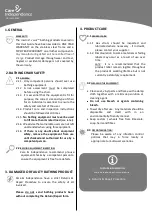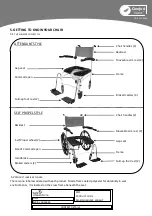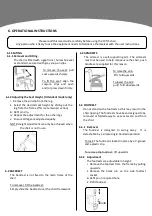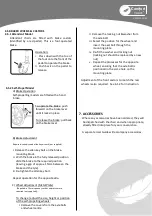
6.5.2 Self-Propel Model
A) Brake Operation
Self-propelling models are fitted with a hand
brake.
To operate the brake: push
forward on the brake lever
until it locks in place
To release the brake: pull back
on the brake lever.
6.5 BRAKED WHEELS & CASTORS
6.5.1 Attendant Model
Attendant chairs are fitted with brake castors
(identified by a red pedal). This is a foot-operated
brake.
Operation:
i. Press down with the toe of
the foot onto the front of the
pedal to operate the brake.
Ii. Push back on the pedal to
release.
UG/CVSC-EN02
VALUE
Comfort
TM
ii. Remove the locking nut & washer from
the axle bolt.
iii. Select the position for the wheel and
insert the axel bolt through the
mounting plate.
iv. Re-fit the washer and locking nut
(locking nut should be replaced by a new
nut)
v. Repeat the processes for the opposite
wheel, ensuring that the axle bolt is
positioned in the same hole on the
mounting plate.
Adjustment of the front castors to match the rear
wheels is also required. See 6.1.2 for instruction.
Where any accessories have been ordered, they will
be dispatched with the chair and when appropriate,
already fitted into place for your convenience.
A separate User Guide will accompany accessories.
B)
Brake Adjustment
Required: suitably sized allen key wrench [not supplied]
i. Release the allen key bolt on the brake-
mounting block.
ii. With the brake in the fully released position
slide the brake to the required position
(leaving a gap of approx. 15mm between the
brake and the tyre).
iii. Re-tighten the allen key bolt.
Repeat operation for the opposite side.
C) Wheel Adjustment (Metal Plate)
(Required: a 19mm spanner, socket and ratchet are
required [not supplied]).
To change / adjust the size, height or position
of the self-propelling wheels:
i. Remove the covers from the axle bolts
and wheel centre.
7. ACCESSORIES
























